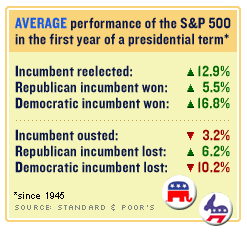NEW YORK (CNN/Money) - Now that President Bush appears to have won four more years in the White House, will the bulls come stampeding back on Wall Street?
| Related Stories
|

|
|
|
That's what many veteran market watchers expect, at least in the near term.
"Wall Street will have gotten the man that most Wall Streeters would want and I think they'd be pulling the corks out of the champagne bottles for a couple of days," said Al Goldman, chief market strategist at A.G. Edwards & Sons in St. Louis.
Corks may not be the only things popping. "We think the S&P 500 could rally about 10 percent into early 2005 if President Bush were to win and the move would start immediately after the election," Lehman Brothers strategist Henry Chip Dickson wrote in a recent report.
Not everyone is quite so optimistic, though. "We think most investors already seem to expect a Bush victory," Tobias Levkovich, chief U.S. equity strategist at Smith Barney, noted last week. "Consequently, we infer that a Bush victory would be somewhat anti-climactic."
While many on Wall Street have grown more comfortable with a possible Kerry presidency -- in part because Congress will probably stay in Republican hands -- investors on balance have shown a decided preference for Bush, at least judging by campaign contributions of those who work for its biggest investment banks.
Of the top ten contributors to the Bush campaign this election cycle, eight are investment banks.
"It certainly means that business is firmly in George Bush's corner," said Dwight Morris of Dwight L. Morris, a group that tracks campaign money. "If contributions were votes of confidence, Wall Street's vote of confidence has been placed with Bush. They see him as being much better for their interests than Kerry."
One big reason is that the president has campaigned on making his tax cuts permanent -- including the reduction of the dividend and long-term capital gains rate to 15 percent.

"In the near-term, the market would prefer a Bush victory because he is familiar and represents lower taxation on equities," Lehman's Dickson wrote, adding that stocks with high yields should do better if Bush gets a second term.
What's more, simply having the election decided should give a lift to campaign-weary investors. As the old cliché holds, Wall Street despises uncertainty, and in this case uncertainty about the election result was heightened by worries that the balloting would result in a protracted legal battle, much as it did four years ago.
"It almost doesn't matter who's elected," said Milton Ezrati, senior economic strategist at Lord, Abbett & Co. in Jersey City, N.J. "The market wants to get out from under the uncertainty of the election."
History also suggests investors can expect some upside after a Bush victory.
Since 1945, the S&P 500 has risen an average of 12.9 percent in the year after an incumbent candidate or party won re-election.

The gains under Republican incumbents (5.5 percent on average) haven't been quite as good as those under returning Democrats (an average 16.8 percent), but it's clear that Wall Street isn't keen on change. When the incumbent was rejected, the index averaged a loss of 3.2 percent.
If Bush is a clear winner, analysts also expect certain sectors to fare better. Tops among those are health care and pharmaceuticals.
"If Bush wins, the price control scare hanging over managed care companies and drug makers would be lifted," wrote Smith Barney's Levkovich.
Defense, energy, and utility stocks are also widely expected to benefit. Financials and asset-management firms could gain as well because the president is perceived to be more market-friendly and has proposed creating new private Social Security investment accounts.
On the other hand, many analysts expect tighter regulatory oversight of mortgage giants Fannie Mae and Freddie Mac to continue under a Bush administration, so those two stocks might continue to languish.
Ultimately, though, the market is more likely to follow the state of the economy and corporate earnings than the resident of the White House. "Over time, specific industry fundamentals are far more important than election results," Levkovich wrote.
And the president will be presiding over an economy that is still struggling with a number of weighty issues.
"We still have a lot of problems on our plate," said A.G. Edwards' Goldman. "No matter who's president we still have Iraq, we still have high-priced oil, we still have the war on terrorism."
Add to those a sluggish job market, a massive federal budget deficit, and forecasts for slowing earnings growth and it's clear that the stock market -- and the occupant of the Oval Office -- will have plenty of obstacles to overcome.

|